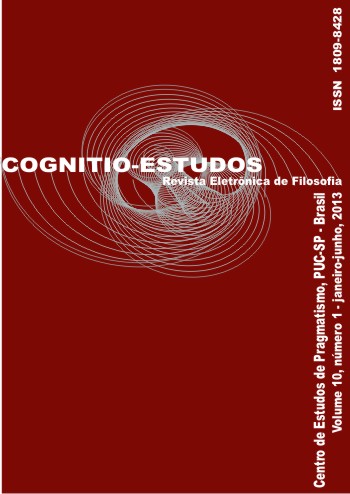Impregnação teórica em Kuhn, Fodor e Pylyshyn: uma revisão preliminar
Keywords:
impregnação teórica das observações, percepção, Kuhn, Fodor, PylyshynAbstract
A tese da impregnação teórica das observações afirma, em linhas gerais, que observações são influenciadas por aspectos cognitivos, como teorias, conceitos, crenças ou estados mentais do observador. Este artigo apresenta uma revisão parcial da literatura sobre o tema, iniciando com a tese tal como empregada por Kuhn em 1962 e discute algumas objeções apresentadas por autores mais recentes, como Fodor e Pylyshyn.Metrics
References
BIRD, Alexander. Thomas Kuhn’s relativistic legacy. In: A companion to relativism. Ed. por S. Hales. Oxford: Wiley-Blackwell, 2011.
BISHOP, Michael. Theory-ladenness of perception arguments. PSA: Proceedings of the Biennial Meeting of the Philosophy of Science Association. pp. 287-299. Vol. 1992, Volume One: Contributed Papers, 1992.
BREWER, William; LAMBERT, Bruce. The theory-ladenness of observation and the theory-ladenness of the rest of the scientific process. Philosophy of Science, 68.3 (Supplement: Proceedings of the 2000 Biennial Meeting of the Philosophy of Science Association. Part I: Contributed Papers) 2001: S176-S186.
BREWER, William; LAMBERT, Bruce. The theory-ladenness of observation: evidence from cognitive psychology. Proceedings of the Fifteenth Annual Conference of the Cognitive Science Society. Institute of Cognitive Science, University of Colorado-Boulder. Hillsdale, NJ: Erlbaum, 1993.
BREWER, William; LOSCHKY, Lester. Top-down and bottom-up influences on observation: evidence from cognitive psychology and the history of science. In: Cognitive Penetrability of Perception. Ed. por A. Raftopoulos. New York: Nova Science Publishers, 2005.
BRUNER, Jerome; POSTMAN, Leo. On the perception of incongruity: a paradigm. In: Journal of Personality 18.2, 1949: 206–223.
BRUNER, Jerome; GOODMAN, Cecile. Value and need as organizing factors in perception. The Journal of Abnormal and Social Psychology 42.1, 1947: 33-44.
CARVALHO, Eros. Figuras ambíguas e a distinção entre ver e ver como. In: Ensaios de epistemologia contemporânea. pp. 93-111. Ed. por A. Gallina e C. Sartori. Ijuí: Unijuí, 2011.
DUHEM, Pierre. The aim and structure of physical theory. 2ª edição. (Trad. por P. Wiener) (originalmente publicado como La théorie physique: son object et sa structure. Paris: Marcel Rivièra, 1914) Princeton: Princeton University Press, 1954.
FEYERABEND, Paul. Explanation, reduction and empiricism. In: Scientific explanation, space and time. Ed. por H. Feigl e G. Maxwell. pp. 28-97. (Minnesota studies in the philosophy of science, vol. III) Minneapolis: University of Minnesota Press, 1962.
FEYERABEND, Paul. Realism, rationalism and scientific method. Cambridge: Cambridge University Press, 1981.
FLECK, Ludvik. Genesis and development of a scientific fact. Ed. por T.Trenn e R. Merton. Chicago: University of Chicago Press, 1979 [1935].
FODOR, Jerry. Observation reconsidered. In: Philosophy of Science 51.1, 1984: 23-43.
GREGORY, Richard. Knowledge in perception and illusion. In: Philosophical Transactions of the Royal Society of London B 352, 1997: 1121-1128.
HANSON, Norwood. Observação e interpretação. In: Filosofia da Ciência. Ed. por S. MORGENBESSER. São Paulo: Cultrix, 1979.
HOLCOMB, Harmon. Circularity and inconsistency in Kuhn’s defense of his relativism. In: The Southern Journal of Philosophy 25.4, 1987: 467-480.
HOYNINGEN-HUENE, Paul. Reconstructing scientific revolutions. Chicago: University of Chicago Press, 1993.
HOYNINGEN-HUENE, Paul & OBERHEIM, Eric. A incomensurabilidade das teorias científicas. (Trad. por Laura Machado do Nascimento). In: Investigação Filosófica, E2, artigo digital 1, 2012. Disponível em: http://investigacao-filosofica.blogspot.com.br/p/verbetes-da-enciclopedia-investigacao_8.html. Acesso em: 17/10/2012.
JONES, William. Theory-ladenness and theory comparison. In: PSA: Proceedings of the Biennial Meeting of the Philosophy of Science Association. pp. 83-92. Volume One: Contributed Papers, 1978.
KUHN, Thomas. A estrutura das revoluções científicas. São Paulo: Perspectiva, 2007 [1962].
KUHN, Thomas. The road since Structure. Ed. por J. Conant & J. Haugeland. Chicago: University of Chicago Press, 2000.
LAKATOS, Imre. MUSGRAVE, Alan (orgs.). A crítica e o desenvolvimento do conhecimento. São Paulo: Cultrix, 1970.
MASTERMAN, Margaret. A Natureza de um paradigma. In: A crítica e o desenvolvimento do conhecimento. Org. por I. Lakatos & A. Musgrave. pp. 72-108 São Paulo: Cultrix, 1970.
MULLER-LYERPIC.PNG. Altura: 265 pixels. Largura: 400 pixels. 24 Kb. Formato PNG. Disponível em: <http://www.excelsiorgroup.co.uk/system/files/uploads/muller-lyerpic.png> Acesso em: 04/11/2011.
POPPER, Karl. A Ciência Normal e Seus Perigos. In: A crítica e o desenvolvimento do conhecimento. Org. por I. Lakatos & A. Musgrave. pp. 63-71.São Paulo: Cultrix, 1970.
PYLYSHYN, Zenon. Is vision continuous with cognition?: The case for cognitive impenetrability of visual perception. In: Behavioral and Brain Sciences 22, 1999: 341-365.
RAFTOPOULOS, A. Cognition and perception: How do psychology and neural science inform philosophy? Massachussets: MIT Press, 2009.
SANKEY, Howard. Kuhn’s ontological relativism. In: Science & Education 9.1-2, 2000: 59-75.
SIEGEL, Harvey. Epistemological relativism in its latest form. In: Inquiry 23.1, 1980: 107-117.

